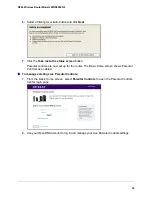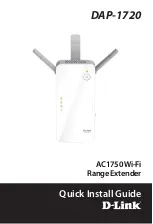
38
N300 Wireless Router Model JWNR2000Tv3
•
Respond to Ping on Internet Port
. If you want the router to respond to a ping from the
Internet, select this check box. Use this setting only as a diagnostic tool because it allows
your router to be discovered. Do not select this check box unless you have a specific
reason.
•
Disable IGMP Proxying
. IGMP proxying allows a computer on the local area network
(LAN) to receive the multicast traffic it is interested in from the Internet. If you do not need
this feature, you can select this check box to disable it.
•
MTU Size (in bytes)
. The normal MTU (maximum transmit unit) value for most Ethernet
networks is 1500 bytes, or 1492 bytes for PPPoE connections. For some ISPs, you might
need to reduce the MTU. Reducing the MTU is rarely required, and should not be done
unless you are sure that it is necessary for your ISP connection. See
Change the MTU
Size
on page 39.
•
NAT Filtering
. Network Address Translation (NAT) determines how the router processes
inbound traffic. Secured NAT provides a secured firewall to protect the computers on the
LAN from attacks from the Internet, but might prevent some Internet games, point-to-point
applications, or multimedia applications from functioning. Open NAT provides a much
less secured firewall, but it allows almost all Internet applications to function.
•
Disable SIP ALG
. Some SIP (Session Initiation Protocol) applications have their own way
to work around the NAT firewall issue, and the SIP ALG (Application Layer Gateway)
would conflict with those solutions. In most cases, you do not have to disable the SIP
ALG. However, if your SIP applications cannot work with the router, you can disable the
SIP ALG and try the applications again. Select the check box to disable SIP ALG.
Default DMZ Server
The default DMZ server feature is helpful when you are using some online games and
videoconferencing applications that are incompatible with Network Address Translation
(NAT). The router is programmed to recognize some of these applications and to work
correctly with them, but other applications might not function well. In some cases, one local
computer can run the application correctly if that computer’s IP address is entered as the
default DMZ server.
WARNING!
DMZ servers pose a security risk. A computer designated as the
default DMZ server loses much of the protection of the firewall and
is exposed to exploits from the Internet. If compromised, the DMZ
server computer can be used to attack other computers on your
network.
















































